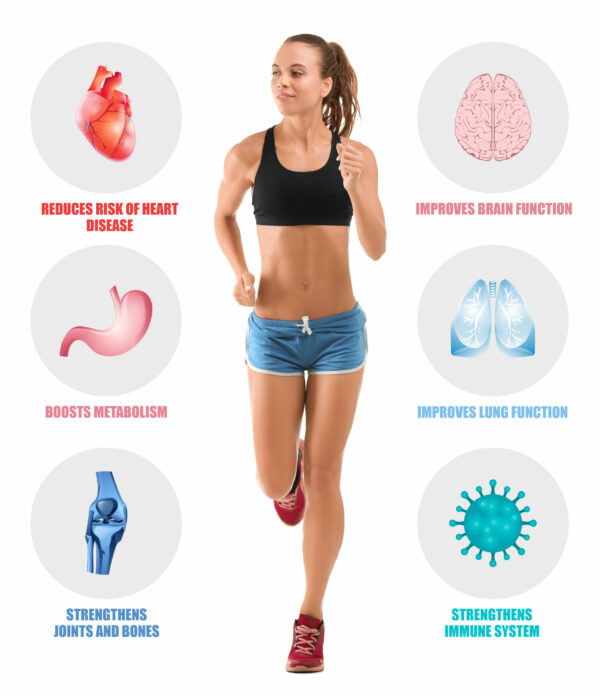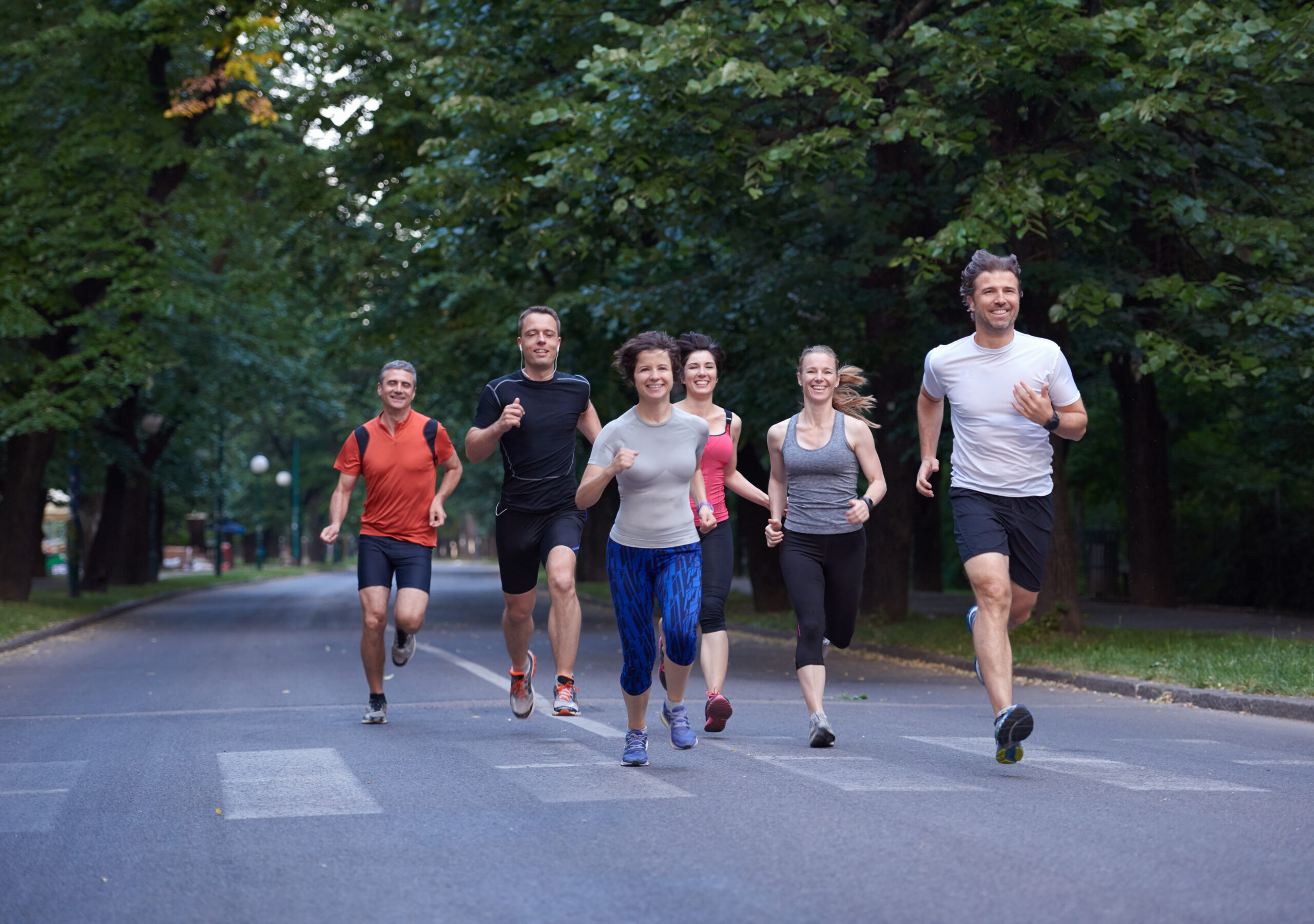What is benefits of exercise – We have heard this before. The benefits of exercising are many. In addition to giving you an opportunity to utilize your full potential and attain great effectiveness, we experience states of excitement, joy, love, trust, and hope that strengthen the body and also set the spirit free. In general, we improve our life quality when we are active and exercise.

People who play sports demonstrate self-control and develop mental strength as well as emotional and physical awareness. We become able to make good decisions because we develop a greater cognitive capacity. Here we’ll take a closer look at how you develop and maintain a good personal exercise practice.
Find Your Reasons To Like Exercise
Many of us have the best intentions of exercising, but it’s not enough if we don’t start. It’s also useless to use the argument of lack of time to get in shape. A better solution is to find a lot of reasons to motivate yourself to exercise and sacrifice some other things even if you are very busy.
Lack of exercise simply leads to a sedentary lifestyle, which predisposes us to chronic diseases such as obesity, muscle atrophy, osteoporosis, stress, and digestive problems.
According to the World Health Organization (WHO), in Europe, it’s estimated that at least 600,000 premature deaths per year are caused by physical inactivity. Worldwide, this number is estimated to be 1.9 million. Similarly, those who are not physically active are more likely to die prematurely.
Think of your internal arguments
The purpose of these numbers above is to encourage people to disregard arguments we usually use such as:
There are not enough hours in the day.
I can’t afford to pay for a gym membership.
Work takes up all my time.
Exercise makes me hungry and I don’t want to gain weight.
Often many of us have no problem finding “holes” to check social networks, watch a movie, or take a nap. All of this is prioritized before exercise.
Reap the benefits of exercising
It ultimately becomes a matter of evaluating your schedule and managing your priorities, including an exercise routine, no matter how simple it is. You don’t have to love exercise. However, finding an exercise activity you like enough to do consistently can help you reap the benefits of exercising.
Try to find a fun activity to do alone, on a team, with friends or colleagues to get the most out of your exercise routines. Anything from handball to running groups or even power walking daily counts toward your exercise goals!

What Is The Benefits Of Exercise – Overview
Physical and emotional activity share biochemical and neurochemical forces (dopamine, endorphins, etc.). For example, the brain releases endorphins during and after physical exercise, which provides emotional well-being and happiness and minimizes the symptoms of depression and anxiety.
Therefore physical strength training will very often also lead to automatic improvements in emotional and mental strength. Similarly, an improved emotional state will also lead to better physical well-being.
When we exercise with e.g. interval training we practically make life swing up and down in a balanced and healthy way. To die is to stop swinging. Living things pulsate, dead things do not.
So, to get the most out of life it’s about balancing our ‘waves’ of energy consumption and recovery periods with the regeneration of energy – everything works together.
Health Benefits of Exercise
Exercise Improves Your Health in a Variety of Ways (see image below). Strength exercises are important for your health and mobility. Strength training is always good regardless of age, but the older you become, the more important it is. Muscle mass and muscle strength decline from around the age of 50.
So the goal of strength training is to delay this process, by maintaining or building muscle mass and strength, as well as ensuring better coordination and balance. There are thus many advantages to be gained here.
Regardless of age, it will always be an advantage to stay in good physical shape with exercises – this applies to both your mobility, strength, and endurance. Whether it’s about increased mobility, a better health profile, or a longer life, exercises will ensure a better quality of life for the individual. The body becomes strong, which also reduces the possibility of injuries and other inconveniences.

Top 7 health benefits of exercise
- Your bones get stronger
Bones that are not challenged by movement quickly lose their strength. In order to strengthen the bones, they must be stressed and exposed to pressure or impact. It can be, for example, like strength training, where the resistance’s pressure on the bones causes them to form a firmer structure. - Your immune system becomes stronger
Regular exercise benefits the immune system and makes the body better able to identify and fight diseases. - Your brain becomes sharper
Physical activity maintains brain cells and brain functions and helps create new nerve cells. It can be felt in both concentration, memory, and much more! - Your lungs can do more
Exercise can make you better at utilizing your lung function. When you exercise regularly, your lungs become more efficient at transporting oxygen to the blood, which carries it to the muscles. - Your heart becomes more efficient
A strong heart is better at pumping blood around the body. When you start to exercise, the body’s need to transport the blood to the working muscles increases, placing greater demands on your heart, which must therefore pump correspondingly faster and more efficiently. - Your weight will be stable
Most of us know that exercise can be a good tool for weight loss, but it’s also good for keeping your weight stable if you don’t need or want to lose weight. Having a stable weight means that your body is under less stress – and you don’t have to buy new pants all the time. - You are creating a good habit
Many people believe that motivation and willpower are essential when it comes to exercise. And when we don’t succeed, it’s because we lack self-discipline. Exercises are much more about habits and repetition, and about constantly taking small steps in the right direction. That’s how you get great results!
Psychological Benefits of Exercise
Many of us start at the gym or working out in general to improve our physical appearance. This applies especially to young people and before the summer- and beach season begins. But training is also good for your mind?
There are actually great psychological benefits to exercising such as improving memory, relieving stress, letting go of anxiety and depression, and improving the ability to learn. Below I have my 4 benefits of exercise from my own ‘exercise career’ over the years.

Physical exercise makes you happier
Every time you do physical exercise, the body will release endorphins. These neurotransmitters make us feel euphoric and full of happiness. This is why exercise is highly recommended for people suffering from especially depression.
Similarly, if you have problems with stress or anxiety, exercise can help to loosen up tensions that strain and wear on the body and mind. This will help us to relax, sleep better, and you will be much more productive in your everyday life.
Exercise Improves self-esteem
Exercise lets you see yourself as healthy and happier. This is a wonderful boost to a person’s self-esteem. It makes us value ourselves more. If you have problems accepting yourself – do exercises! This will almost instantly help you see yourself in a better light and feel better at the same time. You will also show the best side of yourself to others – because you feel it.
Exercise Improves the ‘Real’ social relationships
Having a better self-image, being happy with yourself, and valuing yourself will improve social relationships too. You will have greater faith in yourself, which will help you to create deeper relationships with others.
So, many of the psychological benefits will make you feel more motivated to take part in group activities, team sports and start a conversation with someone you don’t know. Just because you feel good and are social.
Exercises Help to control addictions
If we are addicted to some kind of drugs, alcohol, tobacco or something else, physical exercise can help control it. Sometimes it can even help to stop an addiction completely.
How it can do that?
Researchers have found that addiction is closely linked to especially the hormone dopamine, which is a signal substance – a neurotransmitter – which is primarily found in the brain. The substance provides the driving force for our actions and is particularly important for the regulation of our feelings of well-being, joy, and happiness.
Dopamine is of great importance for many of the body’s physical and psychological functions, such as learning, motoric skills, motivation, and memory. This hormone is also released when you exercise. That is why it is very effective in controlling addictions.
The Biochemical Benefits Of Exercise

So, exercise improves your mood and that is measured and proven during tests. Serotonin, dopamine and endorphins are some of the hormones that are released in the brain when you move and exercise – and they are the reason why you feel so good after a training session.
Endorphins
Endorphins are a pain-relieving hormone and one of the most important elements for lifting your mood and giving you a sense of happiness. When endorphins interact with receptors in the brain, the levels of dopamine and norepinephrine change, releasing a feeling of happiness and strength.
Serotonin
Serotonin plays a crucial role in our psychological well-being. It’s responsible for your good mood and makes you feel calm. There is an optimal amount of exercise that is needed to improve serotonin synthesis in the brain, which is three hours per week or 30 minutes per day.
Dopamine
Dopamine is the most important neurotransmitter in the brain’s reward system and one of the best known. Eating good food, having sex, or exercising can release dopamine which leads to positive feelings that encourage us to repeat those actions. We can therefore become addicted to dopamine and endorphins – and thereby also sex and exercise.
Adrenaline
Adrenaline is a hormone in the adrenal gland that stimulates the sympathetic nervous system. It gives you a higher blood pressure, heart rate, and blood sugar – and thus a quick rush. In addition, you also become less sensitive.
In many ways, you also become less stressed when you train regularly and in particular after a program. While your training is taking place, the level of the stress hormone, cortisol, rises in your body as a result of the increased load that the training affects the body with.
But the benefit is that it subsequently falls to a level that is lower than it was before. So in that way, you prevent stress by stressing your body easily and in a controlled manner through exercises.
Final Thoughts
When you exercise, the muscles produce hormones, which initiate a wide range of chemical processes in the body. Among other things, this will lift your mood, stabilize your appetite and prevent a number of diseases. Your body’s biochemistry is crucial in creating mental- and inner strength. One of the cornerstones in this process is the benefits of exercise.



In this thought-provoking article, I take a new approach to uncover the wide-ranging advantages of regular exercise. Beyond the physical benefits, I delve into the lesser-known aspects that contribute to overall well-being. From mental clarity and emotional balance to fostering social connections, this article presents a holistic view of how exercise impacts various facets of our lives. Join me on this journey to understand the profound and interconnected benefits that exercise offers, redefining our perception of a healthy lifestyle.
Hi Brian Hudon
Thank you for the comment. Good points here!
Hi Henrik, I just read your post about the benefits of exercise and I wanted to say thank you for sharing such a valuable and informative article. This is a great article to promote exercise and its benefits. Movement is essential for our health and happiness. It is not necessary to join in exhausting routines. Exercise can be an activity as simple as jumping, dancing, bouncing, swimming, walking, running, and many more.
Thank you for sharing your experience and thoughts.
Hi Pablo
Thank you for the comment. Yes, exercises can be simple and we reap the benefits when we repeat them over time!